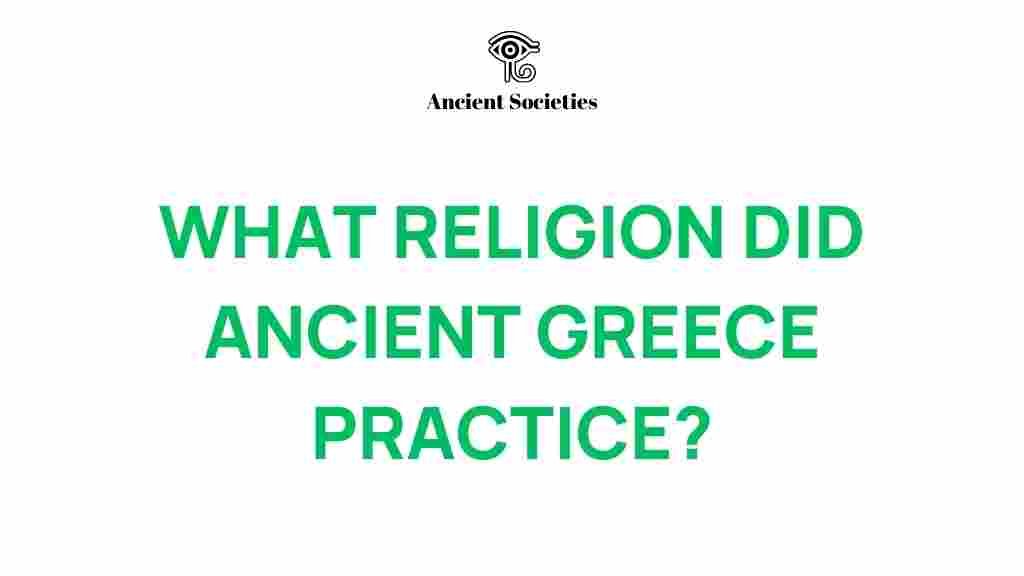Unveiling Ancient Greece: The Intriguing World of Hellenic Religion
Ancient Greece is often celebrated for its profound influence on Western civilization, particularly through its rich mythology, philosophy, and art. However, one of the most fascinating aspects of Ancient Greece is its intricate religious system, known as Hellenic religion. This belief system not only shaped the cultural and spiritual landscape of Ancient Greece but also laid the groundwork for many modern religious practices. In this article, we will explore the various facets of Hellenic religion, including its gods, rituals, temples, and the cultural significance of these beliefs in Ancient Greek society.
The Foundations of Hellenic Religion
Hellenic religion was polytheistic, meaning that the Ancient Greeks worshipped multiple gods and goddesses. These deities were believed to govern various aspects of life and nature, influencing everything from agriculture and war to love and wisdom. The belief system was deeply intertwined with Greek culture, affecting literature, art, and daily life.
- Polytheism: The worship of many gods, each with distinct powers and responsibilities.
- Personification: Natural phenomena and abstract concepts were often personified in the form of deities.
- Cult Practices: Specific rituals were dedicated to individual gods, reflecting the diverse nature of Hellenic spirituality.
The Major Gods of Ancient Greece
The pantheon of Ancient Greek gods is vast and varied, with each deity representing different facets of life. Some of the most significant gods and goddesses include:
- Zeus: The king of the gods, ruler of Mount Olympus, and god of sky and thunder.
- Hera: The queen of the gods and goddess of marriage and family.
- Poseidon: God of the sea, earthquakes, and horses.
- Athena: Goddess of wisdom, warfare, and crafts.
- Apollo: God of the sun, music, arts, and prophecy.
- Dionysus: God of wine, fertility, and revelry.
Each of these gods played a crucial role in the lives of the Ancient Greeks, influencing their values, ethics, and societal norms.
Rituals and Practices in Hellenic Religion
Rituals were a vital aspect of Hellenic religion, serving as a means of communication between mortals and the divine. These rituals varied widely but often included the following elements:
- Offerings: Sacrifices of animals, food, and other goods were made to please the gods.
- Festivals: Public celebrations, such as the Olympic Games, honored specific deities and fostered community spirit.
- Prayer: Personal prayers and invocations were common, seeking favor or guidance from the gods.
These rituals not only reinforced individual spirituality but also helped to build a sense of community and shared identity among the Greek people.
Temples: The Heart of Hellenic Worship
Temples were essential structures in Ancient Greece, serving as places of worship and community gatherings. They were often grand and intricately designed, reflecting the importance of the deity to whom they were dedicated. Some notable temples include:
- The Parthenon: A temple dedicated to Athena, located on the Acropolis of Athens, symbolizing the city’s power and cultural achievements.
- The Temple of Apollo at Delphi: A major site for oracles and prophecies, where seekers would consult the priestess Pythia.
- The Temple of Zeus at Olympia: Home to the ancient Olympic Games and a colossal statue of Zeus, one of the Seven Wonders of the Ancient World.
These temples not only served as religious sites but also as centers of political and social life.
The Role of Mythology in Hellenic Religion
Mythology played a critical role in Hellenic religion, providing narratives that explained the origins of the gods and the universe, as well as moral lessons and cultural values. Some key themes in Greek mythology include:
- Creation Myths: Stories that describe how the world and the gods came into being.
- Heroic Tales: Legends of demigods and heroes, such as Hercules and Achilles, who exemplified Greek virtues.
- Moral Lessons: Myths that conveyed important lessons about hubris, fate, and the human condition.
These stories were not only entertaining but also served to educate and instill values in the Ancient Greek populace.
The Cultural Significance of Hellenic Religion
The impact of Hellenic religion on Greek culture cannot be overstated. It influenced various aspects of daily life, including:
- Art and Literature: Many works of art and literature drew inspiration from mythology and religious themes.
- Philosophy: Philosophers like Plato and Aristotle engaged with religious concepts, exploring the nature of the divine and the cosmos.
- Politics: Religion was intertwined with governance, as rulers often claimed divine favor to legitimize their power.
Through these connections, Hellenic religion helped shape the identity and values of Ancient Greek society.
Modern Perspectives on Hellenic Religion
Today, interest in Hellenic religion and mythology continues to thrive. Scholars and enthusiasts alike delve into the ancient texts, artifacts, and ruins to gain insights into this captivating belief system. Additionally, contemporary neopagan movements often draw inspiration from Hellenic practices, seeking to revive and reinterpret these ancient traditions.
For those interested in exploring more about the modern interpretations of Hellenic spirituality, visit this informative site.
Conclusion
Ancient Greece and its Hellenic religion present a rich tapestry of beliefs, rituals, and cultural practices that have shaped human history. From the majestic temples that still stand as a testament to the architectural prowess of the Greeks to the enduring myths that continue to influence art and literature, the legacy of Hellenic religion is profound. Understanding this ancient belief system not only enhances our appreciation of Greek culture but also deepens our understanding of the human quest for spirituality and meaning.
As we continue to explore the depths of Ancient Greek religion, we uncover not just the history of a civilization, but also timeless truths about humanity’s relationship with the divine.
For more insights into the fascinating history of Ancient Greece and its contributions to modern culture, check out this detailed overview.
This article is in the category History and created by AncientSocieties Team
